人教版五年级英语上册教案 U2-B 第二课时
五年级上册英语教案-Unit 2 My week B Let’s learn 人教PEP

Unit2 B Let’s learn教案一、Teaching Materials AnalysisThis is a vocabulary lesson of unit 2 which is from English Book 5 of People’s Education Press. This main content is the following phrases about actions, such as wash my clothes, play football, do homework, watch TV and etc. and the key sentence patterns “Do you often wash your clothes/...? Yes, I do. / No, I don’t. What do you often do on the weekend? I often …” The key task of this lesson is to enable students to talk about their weekend life.二、Students AnalysisThe teaching objects of this lesson are students in Grade Five. They have a basic knowledge of the sentence patte rn “Do you…? Yes, I do./ No, I don’t.”, which makes a great contribution to learn this lesson well. However, the sentences “What do you often do on the weekend? I often …” are new to them, so some interesting games and activities about sentence practice are necessary.三、Teaching Aims1. Language Knowledge(1) Teaching AimsPresent and practice the vocabulary about actions (wash my clothes, play football, do homework, watch TV, etc.) in the context of what they often do on the weekend. (2) Students’ outcomeStudents will be able to say these words correctly and get a knowledge of their Chinese meanings.2. Language Ability(1) Teaching Aims:Practice asking and answering about their weekend life.(2) Students’ outcome:Students will be able to present their weekend life and ask about what their partners often do on the weekend.3. Affect Attitude4. Teaching AimsEncourage students to arrange their weekend life reasonably and try to enrich their weekend life.(1) Students’ outcomeStudents will have the awareness of “A ll work and no play makes Jack a dull boy”.5. Learning Strategy:(1) Teaching Aims:Encourage students to cooperate with their partners to complete the learning task. (2) Students’ outcome:Students will have the awareness of cooperating with partners to complete the learning task.四、Teaching Key Points and Difficult Points1. Teaching Key PointsHave a good command of some vocabulary and sentence patterns about actions: wash my clothes, play football, do homework, watch TV and etc. “Do you often wash your clothes/...? Yes, I do. / No, I don’t. What do you often do on the weekend? I often …”2. Teaching Difficult PointsBe able to have a good communication with others about their weekend life with the learnt knowledge.五、Teaching AidsMulti-media; a tape-recorder; pictures; chalkboard, etc.六、教学过程Step 1 Warm-up (2 mins)T-SsSing the song “My week” after the tape.Intensions: Review the vocabulary about days in a relaxing atmosphere, which arouses their enthusiasm.Step 2 Lead-in (4 mins)T-SsS-SsAnswer the questions:Q1: How many days are there in a week?Q2: What are they?Q3: Which day do you like best? Why?Intensions: Guide students to express their own ideas through questions of different levels.Step 3 Presentation (16 mins)T-SsS-SsS-S1. Present the vocabulary with my video about my weekend lifeA: Watch the video and answer the questions.B: Read the vocabulary after the tape.Game TimeA: Let’s dance (Look at the phrases and do the actions)B: Look and say (Look at the actions/pictures and say the phrases)Intensions: Watching my video and guessing will arouse students’ curiosity. The challenge time can stimulate students’ interest in practicing the pronunciation of these words. Guide to watch TV in a correct way and cultivate them the awareness of helping at home.Step 4 Production (15 mins)T-SsS-Ss1. Pair work: Talk about their weekend.A: What do you often do on the weekend?B: I often …2. Group work: Work in groups of four and design a colourful weekend. Then choosea reporter to report.Intensions: Group work will help students learn to cooperate with others to complete the learning task and motivate their enthusiasm in the participation in consolidating the new words and sentence patterns. The mind-map will help students to arrangetheir weekend reasonably.Step 5 Summary (2 mins)T-SsMake a summary of the new words and the sentence pattern by raising questions. Step 6 Homework (1 min)T-SsRead after the tape.Design your dream weekend and write them down.。
最新人教PEP版小学英语五年级上册 Unit 2 第2课时公开课教学设计
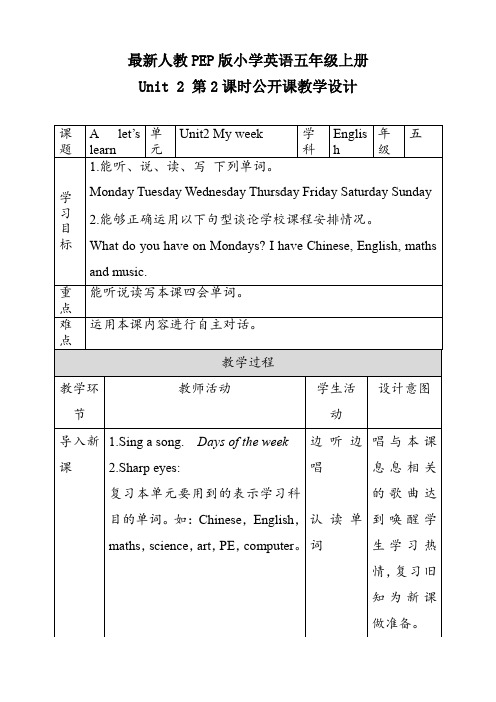
T: What do you do on Sundays?
S: Watch TV, play basketball…
最新人教PEP版小学英语五年级上册
Unit 2 第2课时公开课教学设计
课题
A let’s learn
单元
Unit2 My week
学科
English
年级
五
学习
目标
1.能听、说、读、写下列单词。
Monday Tuesday Wednesday Thursday Friday Saturday Sunday
1.Listen and repeat
2.Sharp eyes.
3.Game:
大小声:教师大声读,学生小声读;教师小声读,学生大声读。
Match
单词接龙:小组中一名学生任意说一个星期类单词,下一位同学说出相邻的星期类单词。
看谁反应快:教师用手势表示1-7中的任何一个数字,学生快速说出相应的星期。
如:教师用手势表示“1”,学生快速说出“Monday”
Now I have some riddle here, let’s guess, what day is it?
①The first day of the week. It’s_______________. We needn’t(不用) go to school.
It’s Sunday. (教读并分辨国内和国外关于一周的第一天的不同)
S: They all have the same word:day.
五上U2_B_Let's_learn_教学设计

6.How about your homework? What time do you do your homework?出示词组教学。
7.教学合成词。完成课本20页表格。
完成表格填空。
学生完成短文书写。
Homework
1.Read page 18 for five times. 18页课本读5遍。
2.Try to remember five phrases.记住5个词组。
8.Pari work. What do you do on the weekend? I oftenand.
学生猜测节目,
学说单词basketball, badminton, volleyball.
学生说chant.
学生回忆并说出含有ea字母组合的单词。
学说homework.
学生完成表格填空。
同桌对话练习。
3.What TV shows does Mike watch?
Listen to the sound.
出示词组教学发音。
出示basketball, ping-pong, badminton, football, volleyball拓展。
4.Let’s chant. Saturday, Saturday, what do you do on Saturdays?
How about Mike? What does he do on the weekend?教学发音及字母组合tch的发音。
Do you oftenon the weekend?
Yes, I do ./ No, sometimes.
人教PEP版-英语-五年级上册-Unit2 第2课时教案示例
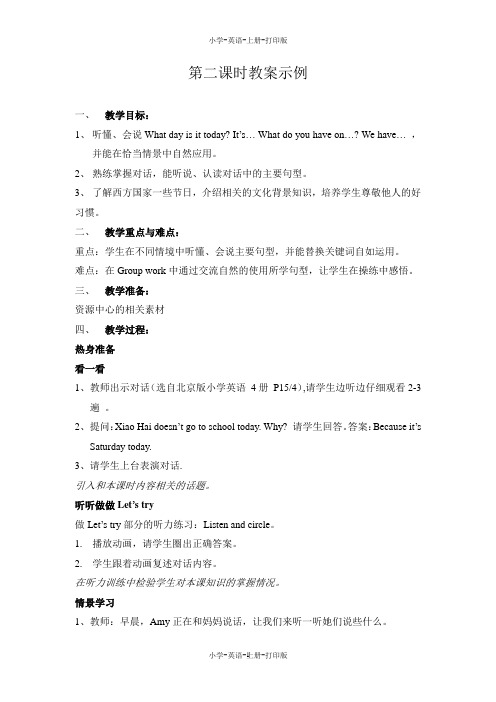
第二课时教案示例一、教学目标:1、听懂、会说What day is it today? It’s… What do you have on…? We have…,并能在恰当情景中自然应用。
2、熟练掌握对话,能听说、认读对话中的主要句型。
3、了解西方国家一些节日,介绍相关的文化背景知识,培养学生尊敬他人的好习惯。
二、教学重点与难点:重点:学生在不同情境中听懂、会说主要句型,并能替换关键词自如运用。
难点:在Group work中通过交流自然的使用所学句型,让学生在操练中感悟。
三、教学准备:资源中心的相关素材四、教学过程:热身准备看一看1、教师出示对话(选自北京版小学英语4册P15/4),请学生边听边仔细观看2-3遍。
2、提问:Xiao Hai doesn’t go to school today. Why? 请学生回答。
答案:Because it’sSaturday today.3、请学生上台表演对话.引入和本课时内容相关的话题。
听听做做Let’s try做Let’s try部分的听力练习:Listen and circle。
1.播放动画,请学生圈出正确答案。
2.学生跟着动画复述对话内容。
在听力训练中检验学生对本课知识的掌握情况。
情景学习1、教师:早晨,Amy正在和妈妈说话,让我们来听一听她们说些什么。
2、播放动画Let’s talk A,学生观看。
3、观看2-3遍后,教师提问:a)What day is it today?学生边回答:Wednesday.b)What does Amy have on Wednesdays?学生边回答:English, science, computer and P.E..4、再看动画,请学生反复跟读。
5、做配套练习。
锻炼学生的听力、理解力及模仿跟读的能力。
对话练习1、分组练习,请学生选择自己喜欢的角色进行扮演。
2、可以请同学给人物配音,也可选择角色进行人、机对话。
人教版小学五年级英语上册 Unit 2 B let's learn 教案
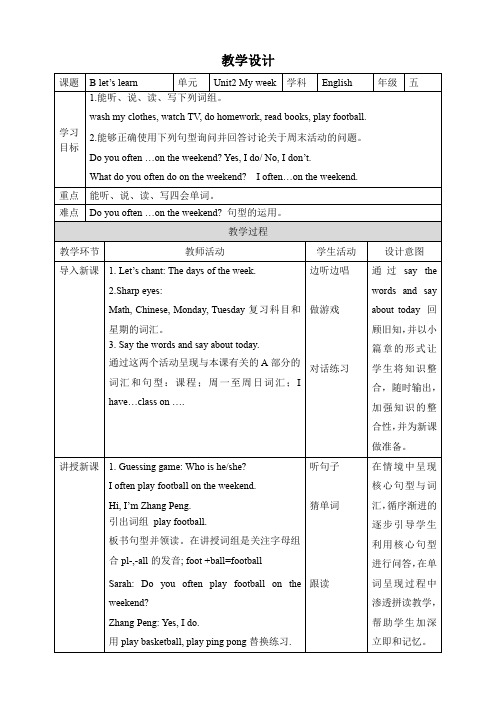
weekend.
Sarah: Who is he/she?
Chen Jie: HI, I’m Chen Jie.
跟读
板书句型并领读。结合自然拼读法强调 wash
以及 clothes 的发音和拼写。
4. Sarah: Do you often wash your clothes on
the weekend?
词呈现过程中 渗透拼读教学, 帮助学生加深 立即和记忆。
2. Sarah: Do you often read books on the 对话练习 weekend? Amy: Yes, I do. 引出 read books. 此词汇比较简单,着重突出 books 复数的存 在。领读并板书。
3. Chen Jie: I often wash my clothes on the
I often…….
创编对话
Do you often…….on the weekend?
Yes, I do/ No, I don’t
1. Listen and repeat. 听完整文本,然后再跟读。
听音正音
2. Game:
做游戏
眼疾嘴快、What’s missing?、teacher says
3. 幸运转盘。
创编对话
课堂小结 What have you learned today?
板书
Unit 2 My week Part A Let’s learn
Do you often ...on the weekend?
play football
Yes, I do/ No, I don’t. wash my clothes
Mike: No, I don’t. I often watch TV.
人教五上 教案 U2-B 第二课时
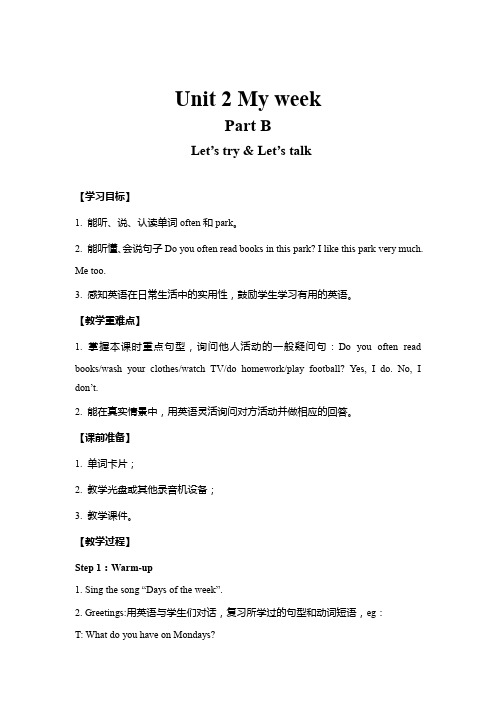
Unit 2 My weekPart BLet’s try & Let’s talk【学习目标】1. 能听、说、认读单词often和park。
2. 能听懂、会说句子Do you often read books in this park? I like this park very much. Me too.3. 感知英语在日常生活中的实用性,鼓励学生学习有用的英语。
【教学重难点】1. 掌握本课时重点句型,询问他人活动的一般疑问句:Do you often read books/wash your clothes/watch TV/do homework/play football? Yes, I do. No, I don’t.2. 能在真实情景中,用英语灵活询问对方活动并做相应的回答。
【课前准备】1. 单词卡片;2. 教学光盘或其他录音机设备;3. 教学课件。
【教学过程】Step 1:Warm-up1. Sing the song “Days of the week”.2. Greetings:用英语与学生们对话,复习所学过的句型和动词短语,eg:T: What do you have on Mondays?Ss: We have Chinese, English…T: What do you have on Tuesdays?Ss: We have maths, science …T: What do you do on the weekend?Ss: We often read books, watch TV…Step 2:Presentation1. 教学新单词①教师说:Do you know what I like doing? I like reading books. I often read books. I read books on Mondays, Wednesdays Thursdays, Saturdays and Sundays. Do you often read books? What do you often do?,由此引出单词“often”。
五年级上册英语U2第二课时教案
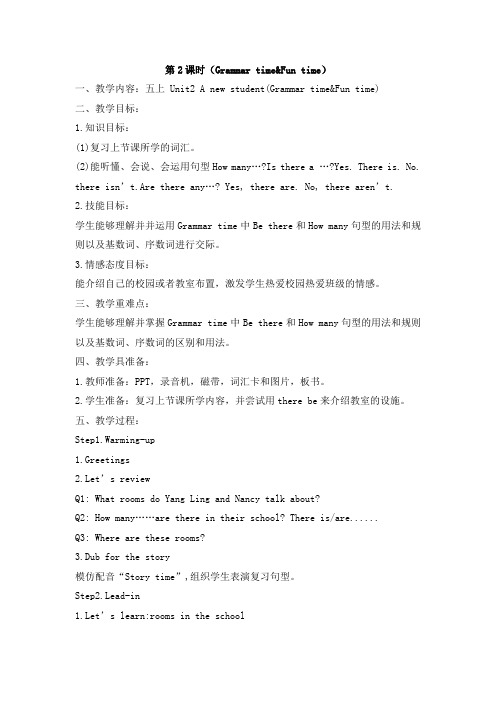
第2课时(Grammar time&Fun time)一、教学内容:五上 Unit2 A new student(Grammar time&Fun time)二、教学目标:1.知识目标:(1)复习上节课所学的词汇。
(2)能听懂、会说、会运用句型How many…?Is there a …?Yes. There is. No. there isn’t.Are there any…? Yes, there are. No, there aren’t.2.技能目标:学生能够理解并并运用Grammar time中Be there和How many句型的用法和规则以及基数词、序数词进行交际。
3.情感态度目标:能介绍自己的校园或者教室布置,激发学生热爱校园热爱班级的情感。
三、教学重难点:学生能够理解并掌握Grammar time中Be there和How many句型的用法和规则以及基数词、序数词的区别和用法。
四、教学具准备:1.教师准备:PPT,录音机,磁带,词汇卡和图片,板书。
2.学生准备:复习上节课所学内容,并尝试用there be来介绍教室的设施。
五、教学过程:Step1.Warming-up1.Greetings2.Let’s reviewQ1: What rooms do Yang Ling and Nancy talk about?Q2: How many……are there in their school? There is/are......Q3: Where are these rooms?3.Dub for the story模仿配音“Story time”,组织学生表演复习句型。
Step2.Lead-in1.Let’s learn:rooms in the schoolart room、classroom、computer room、library、music room、playground PPT出示图片,学生通过看图听、说、读、拼写进一步学习单词2.Free talk(1)T: Can you show me around our school?S:There is a …/ There are some…出示学校平面图(2)T: Can you show me around our classroom?S:There is a …/ There are some…Step3. Fun time1.T: OK,you have introduced our classroom. Look, this is Nancy’s classroom in her new school.Do you have any questions?How many desks and chairs are there in the classroom?Is there a computer?Are there any pictures? …Step4.Grammar time1. T: Oh, that’s Nancy’s classroom. This is my dream classroom. What’s in it? Guess!Ss: ...引导学生用there be句型的一般疑问句来提问。
人教版(PEP)英语五年级上册《Unit2MyweekPartB》教学设计
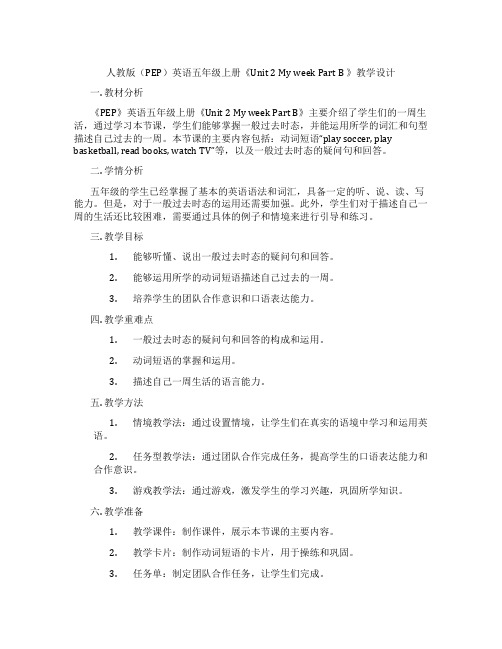
人教版(PEP)英语五年级上册《Unit 2 My week Part B 》教学设计一. 教材分析《PEP》英语五年级上册《Unit 2 My week Part B》主要介绍了学生们的一周生活,通过学习本节课,学生们能够掌握一般过去时态,并能运用所学的词汇和句型描述自己过去的一周。
本节课的主要内容包括:动词短语“play soccer, play basketball, read books, watch TV”等,以及一般过去时态的疑问句和回答。
二. 学情分析五年级的学生已经掌握了基本的英语语法和词汇,具备一定的听、说、读、写能力。
但是,对于一般过去时态的运用还需要加强。
此外,学生们对于描述自己一周的生活还比较困难,需要通过具体的例子和情境来进行引导和练习。
三. 教学目标1.能够听懂、说出一般过去时态的疑问句和回答。
2.能够运用所学的动词短语描述自己过去的一周。
3.培养学生的团队合作意识和口语表达能力。
四. 教学重难点1.一般过去时态的疑问句和回答的构成和运用。
2.动词短语的掌握和运用。
3.描述自己一周生活的语言能力。
五. 教学方法1.情境教学法:通过设置情境,让学生们在真实的语境中学习和运用英语。
2.任务型教学法:通过团队合作完成任务,提高学生的口语表达能力和合作意识。
3.游戏教学法:通过游戏,激发学生的学习兴趣,巩固所学知识。
六. 教学准备1.教学课件:制作课件,展示本节课的主要内容。
2.教学卡片:制作动词短语的卡片,用于操练和巩固。
3.任务单:制定团队合作任务,让学生们完成。
七. 教学过程1.导入(5分钟)通过歌曲“What did you do yesterday?”导入本节课,让学生们复习一般过去时态,激发学生的学习兴趣。
2.呈现(10分钟)利用课件,展示本节课的主要内容,包括动词短语和一般过去时态的疑问句和回答。
让学生们跟读并模仿。
3.操练(10分钟)将学生们分成小组,每组分发一套动词短语的卡片,学生们轮流抽取卡片,用一般过去时态回答。
- 1、下载文档前请自行甄别文档内容的完整性,平台不提供额外的编辑、内容补充、找答案等附加服务。
- 2、"仅部分预览"的文档,不可在线预览部分如存在完整性等问题,可反馈申请退款(可完整预览的文档不适用该条件!)。
- 3、如文档侵犯您的权益,请联系客服反馈,我们会尽快为您处理(人工客服工作时间:9:00-18:30)。
Unit 2 My week
Part B
Let’s try & Let’s talk
【教学目标】
1. 能听、说、认读单词often和park。
2. 能听懂、会说句子Do you often read books in this park? I like this park very much. Me too.
3. 感知英语在日常生活中的实用性,鼓励学生学习有用的英语。
【教学重难点】
1. 掌握本课时重点句型,询问他人活动的一般疑问句:Do you often read books/wash your clothes/watch TV/do homework/play football? Yes, I do. No, I don’t.
2. 能在真实情景中,用英语灵活询问对方活动并做相应的回答。
【课前准备】
1. 单词卡片;
2. 教学光盘或其他录音机设备;
3. 教学课件。
【教学过程】
Step 1:Warm-up
1. Sing the song “Days of the week”.
2. Greetings:用英语与学生们对话,复习所学过的句型和动词短语,eg:
T: What do you have on Mondays?
Ss: We have Chinese, English…
T: What do you have on Tuesdays?
Ss: We have maths, science …
T: What do you do on the weekend?
Ss: We often read books, watch TV…
Step 2:Presentation
1. 教学新单词
①教师说:Do you know what I like doing? I like reading books.
I often read books. I read books on Mondays, Wednesdays Thursdays, Saturdays and Sundays. Do you often read books? What do you often do?,由此引出单词“often”。
②教师用出示“公园”的图片,引出单词“park”。
③师生用“唱反调”的方式操练新单词。
④教师出示下列句式,学生根据实际情况造句子:I often _________ in the park.
2. 教师把生词写在黑板上,带领学生读几遍。
3. 介绍对话情景
T: It’s Saturday afternoon. Zhang Peng and Sarah are in the park. They are talking now. Let’s listen to the tape and see wha t they’re talking about.
4. 第一次播放教学录音,全班学生跟着录音读,提醒学生在跟读的过程中注意模仿录音中的语音、语调。
第二次播放教学录音,学生听完录音后回答下面问题:
① What’s that in Sarah’s hand?
② Does Sarah often read books in the park?
③ What does Zhang Peng often do in the park?
④ Do they like the park?
让学生用结对问答的方式呈现答案。
第三次播放教学录音,全班学生跟着录音读,提醒学生在跟读的过程中药注意模仿录音中的语音、语调。
5. 学生拿出人物头饰,同桌合作练习表演对话,然后教师请几对学生上讲台表演,评选出“最佳表演者”,并给予小礼物作为奖励。
Step 3:Consolidation and extension
1. 用关键词替换对话中原有的read books、play football等关键动词词组,创造新的语境,让学生操练句型并表演。
2. 完成Ask and answer,用play ping-pong、play football、listen to music等动词短语,并运用句型:Do you often…on the weekend? Yes, I do. No, I don’t.小转盘转啊转,转到谁,就点
名和partner一起对话,询问并作答。
Step 4:Homework
1. 熟读Let’s talk.
2. 根据Let’s talk写一个对话。
【板书设计】
Unit 2 My week
—Do you often play ping pong on the weekend?
—Yes, I do./No, I don't.
play football listen to music
【教学反思】
本课时进一步巩固询问对方活动的一般疑问句,并要求学生会做肯定和否定回答,如:Do you often read books/play football/play ping-pong/listen to music on the weekend? Yes, I do. No, I don’t.并要求学生能在真实情景中,用英语交流活动安排。
本课时以口语交际为主,主要要求学生会读、会说,旨在提高学生口语交际能力。
